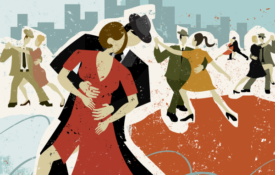-

Safe Sex or Risky Romance? Young Adults Make the Rational Choice
New research suggests that young adults are instead quite rational when it comes to selecting potential sexual partners. Visit Page
-

A Cloudy Future: Why We Don’t Trust Algorithms When They’re Almost Always Right
What explains our preference for human skill and instinct over technologies that have proven themselves better than us at driving, performing surgery, and making hiring decisions? Visit Page
-

New Content From Current Directions in Psychological Science
A sample of articles on the role of situation in psychological science, neuroscience and moral behavior, learning to write, stress, and the role of emotions on attention and work performance. Visit Page
-

APS Awards Nomination Deadline October 15
Nominations are due October 15 for APS Fellows as well as the APS William James Fellow Award, APS James McKeen Cattell Award, and APS Mentor Award.” Visit Page
-
‘I’m Extremely Controversial’: the Psychologist Rethinking Human Emotion
In early March, as the world began to realise that coronavirus wasn’t going to go quietly, psychology professor Lisa Feldman Barrett was thousands of miles away from home. “I went to New Zealand because I was getting an honorary degree,” she tells me over the phone from lockdown in Newton, a leafy suburb of Boston, Massachusetts, where she runs a lab devoted to the study of emotions. She had arranged the trip to coincide with spring break so her college-age daughter could join her and see the sights. But as countries around the world began to impose restrictions, she started having second thoughts. “I was asking myself, should she really be coming, or should we be going home?
-
We Can Help Shape How Our Children Remember the Pandemic — and Foster Their Future Happiness
APS Member/Author: Daniel Willingham My kids won’t be in school full-time this fall, so, like most parents, I will be thinking about how to keep them occupied and content. But I’m also a memory researcher, and that makes me wonder how they will recall these odd times decades from now. Naturally, I hope those memories will be more pleasant than miserable. That goal sounds uncomplicated — happy kids should grow into adults with happy memories. But reminiscences aren’t a simple averaging of experience. I’m not out to manipulate my kids, but knowing how memory works helps me shape what my children will recall of 2020. What’s a desirable “normal” of the pandemic?


